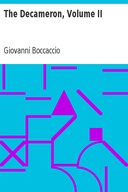Explore

The Decameron (Italian title: "Decameron" [deˈkaːmeron; dekameˈrɔn; dekameˈron] or "Decamerone" [dekameˈroːne]), subtitled "Prince Galehaut" (Old Italian: Prencipe Galeotto [ˈprentʃipe ɡaleˈɔtto; ˈprɛntʃipe] and sometimes nicknamed "Umana commedia", "Human comedy"), is a collection of novellas by the 14th-century Italian author Giovanni Boccaccio (1313–1375). The book is structured as a frame story containing 100 tales told by a group of seven young women and three young men sheltering in a secluded villa just outside Florence to escape the Black Death, which was afflicting the city. Boccaccio probably conceived of The Decameron after the epidemic of 1348, and completed it by 1353. The various tales of love in The Decameron range from the erotic to the tragic. Tales of wit, practical jokes, and life lessons contribute to the mosaic. In addition to its literary value and widespread influence (for example on Chaucer's The Canterbury Tales), it provides a document of life at the time. Written in the vernacular of the Florentine language, it is considered a masterpiece of classical early Italian prose.
From Wikipedia (CC BY-SA).
This book is included in Project Gutenberg.
Why read this book? Have your say.
You must be logged in to comment.
Rights Information
Are you the author or publisher of this work? If so, you can claim it as yours by registering as an Unglue.it rights holder.Downloads
This work has been downloaded 405 times via unglue.it ebook links.
- 138 - epub (0.1) (PD-US) at Github.
- 119 - mobi (0.1) (PD-US) at Github.
- 148 - pdf (0.1) (PD-US) at Github.
Keywords
- Allegories
- Frame-stories
- GITenberg
- Plague -- Europe -- History -- Fiction
- PQ
- Storytelling -- Fiction
Links
web: http://www.gutenberg.org/ebooks/13102Editions

